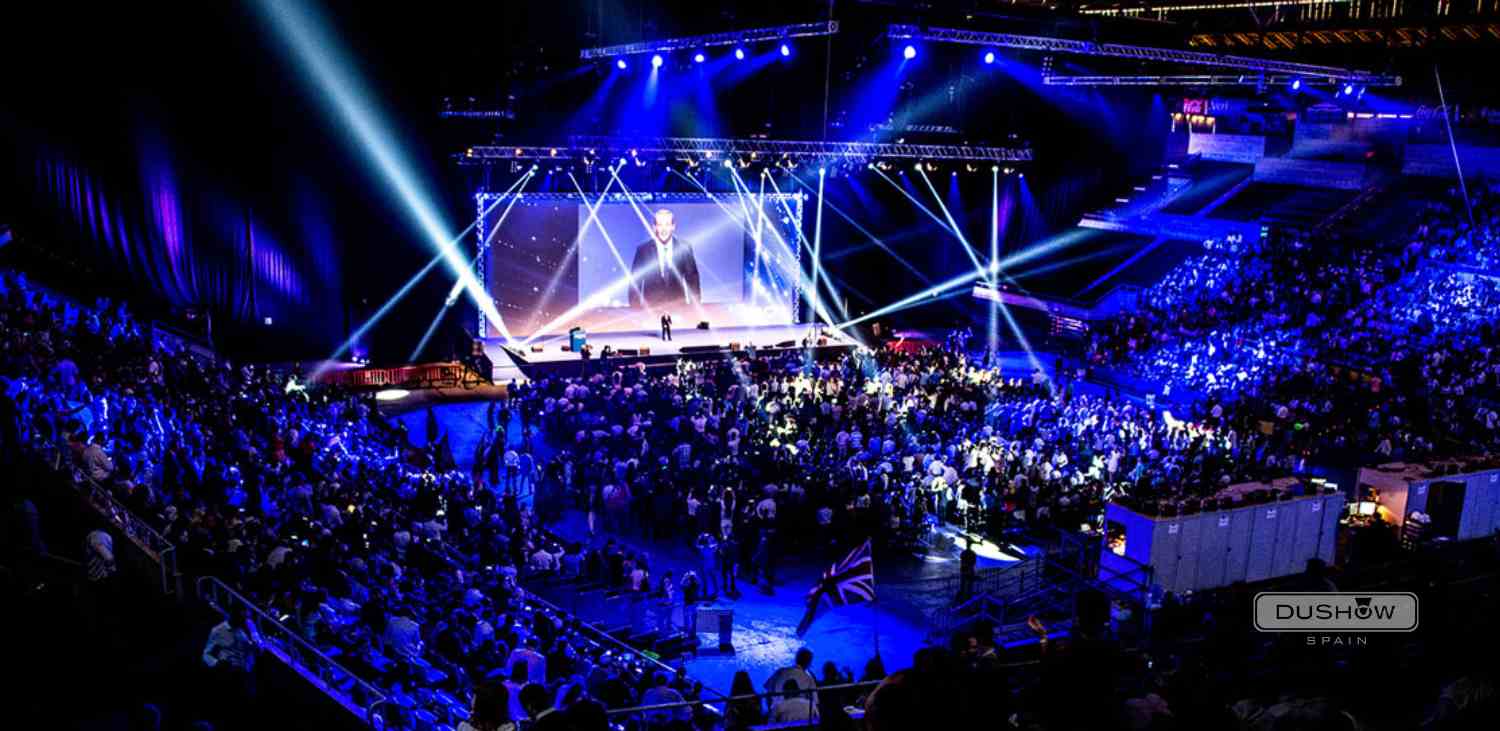Use event production charlotte to craft an unforgettable visual experience
Exactly How Event Production Functions: A Comprehensive Check Out the Refine
Event production is a complicated and structured procedure that calls for cautious planning and execution. It begins with developing clear goals and comprehending the target audience. Each step, from budgeting to place option, plays a crucial role in ensuring success. As the process unfolds, numerous components need to straighten seamlessly. Yet, the nuances of this intricate procedure commonly go undetected. What are the crucial stages that add to an unforgettable event?

The Preliminary Drawing Board
When starting on event production, cautious preparation is vital to assure an effective end result. The first drawing board acts as the structure for all succeeding initiatives. During this phase, event manufacturers must define the event's objective and purposes plainly. Recognizing the target audience helps customize the experience and messaging, ensuring importance and engagement.Producers must likewise consider the event format, whether it be in-person, virtual, or crossbreed, as this will certainly affect different logistical aspects. Picking an appropriate day and place is important, as it affects access and availability.Furthermore, constructing a dependable team is basic for dividing duties and enhancing interaction. Developing a timeline with landmarks assurances all tasks are finished on timetable. This phase involves thorough study, consisting of determining potential obstacles and devising approaches to minimize threats. Eventually, a well-structured initial planning stage establishes the tone for an effective event production trip.

Budgeting and Source Allowance
In event production, reliable budgeting and resource appropriation are important for success - event production charlotte. Establishing economic specifications sets the foundation for all subsequent choices, while resource circulation strategies ensure that every part of the event is appropriately sustained. Together, these aspects help keep control over expenditures and maximize using offered resources
Developing Financial Parameters
Establishing financial parameters is crucial to the success of any kind of event production, as it establishes the foundation for efficient budgeting and source allowance. This procedure begins with defining the general budget plan, which incorporates all elements of the event, including location prices, catering, and advertising and marketing. By recognizing readily available funds, event planners can focus on expenses and allot resources as necessary. Furthermore, it is vital to carry out comprehensive marketing research to expect possible expenses and determine financing resources, such as sponsorships or ticket sales. Developing clear economic criteria additionally help in threat monitoring, allowing coordinators to allot backup funds for unanticipated costs. Eventually, a distinct spending plan works as a roadmap, guiding the event production group in the direction of attaining their objectives while keeping economic control.
Source Circulation Strategies
Effective source circulation methods are crucial for maximizing the impact of an event while adhering to budget constraints. Effective event production calls for a thorough method to budgeting and resource allocation. Organizers need to focus on crucial elements such as venue, wedding catering, and technology, making certain that funds are designated to areas that boost participant experience. A detailed spending plan must lay out anticipated expenses and identify locations for potential cost savings, such as bargaining with vendors or exploring sponsorship opportunities. In addition, tracking expenses throughout the preparation procedure aids stop overspending. By utilizing critical source circulation, event manufacturers can provide a memorable experience while keeping monetary obligation, ultimately adding to the total success of the event.
Location Option and Logistics
Selecting the appropriate location is important to the success of any type of event, as it establishes the stage for the total experience. Place selection includes reviewing numerous factors, including ability, ease of access, and place. Organizers should take into consideration the target audience and the nature of the event, making sure the place aligns with the event's goals.Logistics play a considerable duty in this process, including arrangements for seating, audiovisual tools, and catering solutions. An appropriate venue ought to promote smooth circulation for attendees and staff, improving engagement.Additionally, assessing potential locations for services like parking, washrooms, and fire escape is necessary for safety and security and benefit. The timeline for safeguarding the location is also vital, as prominent areas might schedule promptly - event production charlotte. Subsequently, thorough planning and prompt implementation can ultimately add to a seamless event experience, making venue choice and logistics essential parts of effective event production
Imaginative Idea Development
While the location establishes the physical stage, imaginative idea growth forms the event's identity and narrative. This process begins with identifying the event's purpose and target audience, enabling event manufacturers view it to create a compelling style that reverberates with guests. Brainstorming sessions typically consist of varied point of views, fostering innovative concepts that straighten with the event's goals.Once a motif is developed, aesthetic elements such as shade schemes, signs, and style are made to boost the total atmosphere. Narration methods may additionally be integrated to create an appealing trip for individuals, guaranteeing an unforgettable experience. Furthermore, factors to consider relating to amusement, tasks, and interactive parts are lined up with the chosen idea, enhancing the style throughout the event.Ultimately, reliable creative idea development warranties that every element of the event functions cohesively, leaving a long-term impression on attendees and fulfilling the event's objectives. This fundamental work prepares for subsequent planning and execution stages.
Collaborating With Suppliers and Providers
Effective event production rests on effective cooperation with suppliers and distributors. Picking reputable companions, bargaining contracts successfully, and making sure timely shipments are crucial actions in this process. Each of these aspects contributes considerably to the overall success and smooth implementation of an event.
Choosing Reliable Partners
How can event coordinators guarantee a smooth production experience? Choosing reputable companions is vital in achieving this goal. Event organizers should conduct thorough research study to determine vendors and vendors with a tested performance see post history of quality. This includes inspecting referrals, assessing profiles, and examining consumer responses. Organizers need to prioritize companions who show professionalism and reliability, timely communication, and a desire to collaborate. Building strong connections promotes trust and allows quick problem-solving during the event. In addition, it is valuable to select regional suppliers who comprehend the location and regional logistics. Inevitably, a successful event rests on the harmony between planners and their companions, making certain that every facet of production runs smoothly and effectively.
Bargaining Contracts Properly
Reliable arrangement of agreements is an important action in the partnership between event planners and their suppliers and providers. This procedure involves clear interaction of expectations, deliverables, and timelines. Organizers need to conduct comprehensive research on market rates and market standards why not try this out to develop a standard for arrangements. It is essential to produce a collective ambience, urging open discussion about terms, pricing, and potential backups. Organizers ought to also prioritize comprehending the supplier's abilities and constraints to align their needs effectively. Versatility can bring about equally beneficial arrangements, promoting lasting relationships. Crafting well-defined contracts that include certain efficiency metrics can assist ensure accountability, ultimately leading to effective event execution and contentment for all celebrations entailed.
Guaranteeing Timely Distributions
Timely distributions are vital for the smooth implementation of any kind of event, needing thorough collaboration between organizers and their suppliers and distributors. Effective communication is essential, as it assists develop clear assumptions relating to shipment schedules, amounts, and details demands. Organizers often create comprehensive timelines to lay out essential milestones, making certain all parties remain straightened throughout the process. Normal check-ins with suppliers can help recognize possible delays early, enabling for proactive remedies. Furthermore, developing solid relationships with trusted vendors fosters depend on and responsibility, which can result in better solution and prioritization. By prioritizing these collaborative initiatives, coordinators can decrease disturbances, consequently boosting the general efficiency of event production and making sure that all essential products and services get here as prepared.
Marketing and Promo Approaches
While arranging an occasion, the success of marketing and promo methods can considerably affect participation and involvement. Efficient approaches frequently include a combination of digital marketing, conventional advertising and marketing, and grassroots outreach. Utilizing social media sites systems allows for real-time interaction and targeted advertising, getting to particular demographics successfully. Email advertising campaigns can further involve potential attendees with customized web content and reminders.Collaborations with influencers or industry leaders can also improve reliability and broaden reach. Developing interesting content, such as videos or blog sites, assists to generate buzz and sustain passion leading up to the event. In addition, leveraging early-bird price cuts and unique rewards can incentivize ticket purchases.Promoting through conventional networks, such as posters or local media, remains appropriate, specifically in community-focused events. A thorough approach that incorporates several approaches guarantees optimum presence and engagement, eventually adding to the event's success and the production of an unforgettable experience for guests.
On-Site Execution and Monitoring
On-site implementation and administration are vital parts that establish the total success of an event. Efficient control throughout the event ensures that all elements straighten with the prepared agenda. Event managers manage logistics, including supplier control, devices arrangement, and guest solutions. Checking timelines and attending to any kind of unexpected concerns are essential for preserving a smooth experience.The team plays a substantial duty, as trained workers are accountable for numerous tasks such as enrollment, information circulation, and technological assistance. Communication amongst employee is imperative; it fosters a collective atmosphere and allows quick resolution of challenges.Additionally, safety procedures have to be complied with, safeguarding the wellness of all attendees. Post-event assessments are additionally part of on-site administration, providing insights for future renovations. By concentrating on these facets, event manufacturers can develop unforgettable experiences that fulfill or go beyond participant expectations while accomplishing the event's objectives.
Often Asked Inquiries
Just how Do I Pick the Right Event Motif?
Picking the best event motif entails considering the target market, event purpose, and place. Looking into current trends and gathering input from stakeholders can also influence creative concepts that reverberate and create a remarkable experience.

What Are Common Mistakes in Event Production?
Usual mistakes in event production frequently include inadequate planning, poor interaction amongst employee, budget plan mismanagement, neglecting to take into consideration the audience's needs, and stopping working to conduct a complete post-event assessment for future renovations.
Exactly How Can I Gauge Event Success?
To determine event success, one can evaluate participant contentment, involvement levels, spending plan adherence, and post-event feedback. Key efficiency indicators, such as ticket sales and social networks interactions, also provide useful understandings into overall efficiency.
What Should I Do if It Rains on the Event Day?
In case of moisten the day, the organizer should carry out backup plans, such as protecting outdoors tents or moving activities inside. Interaction with guests about adjustments is necessary to guarantee a smooth experience in spite of weather obstacles.
Just How Can I Make Certain Participant Involvement During the Event?
